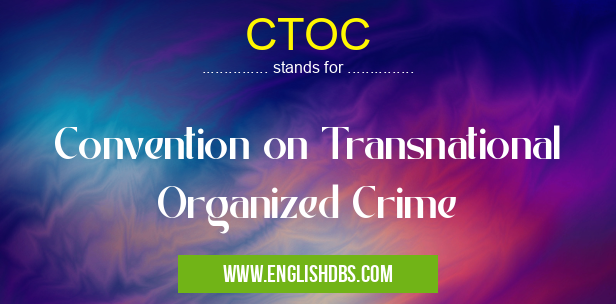What does CTOC mean in LAW & LEGAL
The Convention on Transnational Organized Crime (CTOC) is a United Nations treaty that seeks to combat international organized crime. The CTOC is the first global instrument of its kind, incorporating a comprehensive set of legal measures against transnational organized crime. It was adopted by the United Nations General Assembly in November 2000 and entered into force in September 2003. It aims to provide a framework for fighting organized criminal activities across borders and ensures that those involved are held accountable.

CTOC meaning in Law & Legal in Governmental
CTOC mostly used in an acronym Law & Legal in Category Governmental that means Convention on Transnational Organized Crime
Shorthand: CTOC,
Full Form: Convention on Transnational Organized Crime
For more information of "Convention on Transnational Organized Crime", see the section below.
What Does CTOC Mean?
CTOC stands for the Convention on Transnational Organized Crime, an agreement between nations that works to tackle organized crime at an international level. This treaty is designed to harmonize domestic laws and regulations, making it easier for countries to extradite criminals across borders if they are accused of committing any crimes related to transnational organized crime, such as human trafficking, drug trafficking, money laundering, corruption and terrorist financing. Furthermore, it encourages mutual assistance among signatory states in order to successfully investigate and prosecute criminals involved in these activities. The CTOC also covers measures relating to confiscation of illicit funds or assets used or obtained from transnational criminal activities.
Essential Questions and Answers on Convention on Transnational Organized Crime in "GOVERNMENTAL»LAW"
What is the Convention on Transnational Organized Crime?
The Convention on Transnational Organized Crime, also called Palermo Convention, is an international legal instrument of the United Nations Office on Drugs and Crime (UNODC) that was created to combat transnational organized crime. It entered into force in September 2003 after being signed by more than 140 countries. The convention provides a framework for international cooperation in preventing and prosecuting various forms of organized crime.
What topics does the Convention on Transnational Organized Crime address?
The Palermo Convention covers a wide range of topics related to transnational organized crime, including money laundering, migrant smuggling, human trafficking, human smuggling and arms trafficking. It also establishes legal frameworks for asset seizure and confiscation from criminal enterprises.
How can countries implement the Convention on Transnational Organized Crime?
To implement the Palermo Convention, countries must first adopt domestic legislation that reflects its provisions. This includes laws addressing areas such as mutual assistance between states in criminal matters, witness protection and extradition procedures. Countries are also encouraged to establish law enforcement agencies that focus specifically on transnational crimes committed within their borders.
Who monitors implementation of the Convention on Transnational Organized Crime?
The Conference of Parties (COP) monitors the implementation of the Palermo Convention and convenes regularly to review progress made by signatories to conform with its requirements. Signatories must submit reports detailing their efforts to implement the convention at each COP meeting or risk breaching their agreement with UNODC.
Does every country need to sign up for the Convention on Transnational Organized Crime?
While it is not mandatory for countries to sign up for the Palermo Convention, UNODC encourages as many countries as possible to do so in order to make it more effective in combating transnational organized crime globally. In addition, greater cooperation between countries is needed for prosecution of criminals who operate across multiple jurisdictions.
What type of documents are required for states signing up to the convention?
For states wishing to join the Palermo Convention, they are required to provide certain documents such as a National Report containing information about their national efforts; an Implementation Plan outlining their commitments; a Certificate containing evidence that they have ratified all treaties listed in its Annex I; and a Declaration expressing their understanding about how universal application is important in order for them to benefit from it fully.
Can non-members still benefit from provisions under the convention?
Non-members may still receive assistance under certain parts of the Palermo Convention; however they are not bound by any obligations outlined within it or subject to any consequences if they fail to comply with them. As such non-members should consider joining as soon as possible if they wish gain full access to all its provisions.
Are there any penalties associated with breaching international agreements under this convention?
Yes there are penalties associated with breaching international agreements under this convention, which could include sanctions like economic embargoes and restrictions on weapon imports or exports depending on severity of breach.
Do parties have an option when deciding whether they want trial proceedings taking place domestically or internationally?
Generally parties should agree upon having proceedings take place at either party’s designated domestic court presuming both parties have no objection but if one party has objection then decision lies upon COP.
Is there any International Court available that oversees disputes between members who fail fulfil agreed obligations under this convention?
Currently no such International Court exists but negotiations are ongoing between members that might help bring into existence one such court sometime in future which will supervise cases involving disputes arising from non-compliance.
Final Words:
The CTOC is an essential tool for international criminal law enforcement and justice systems when attempting to prevent crimes such as human trafficking, drug trafficking and money laundering occurring across borders. The treaty has been signed by over 130 countries worldwide since its adoption at the United Nations in 2000 and continues to be an important point of reference in the fight against transnational organized crime.
